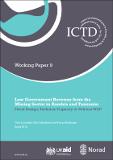| dc.contributor.author | Olav, Lundstøl | |
| dc.contributor.author | Gaël, Raballand | |
| dc.contributor.author | Fuvya, Nyirongo | |
| dc.coverage.spatial | Zambia | en |
| dc.coverage.spatial | Tanzania | en |
| dc.date.accessioned | 2016-03-18T08:59:02Z | |
| dc.date.available | 2016-03-18T08:59:02Z | |
| dc.date.issued | 2015-09-19 | |
| dc.identifier.citation | Olav, L., Gaël, R. and Fuvya, N. (2015) Low Government Revenue from the Mining Sector in Zambia and Tanzania: Fiscal Design, Technical Capacity or Political Will? ICTD Working Paper 9. Brighton: IDS. | en |
| dc.identifier.isbn | 978-1-78118-115-7 | |
| dc.identifier.uri | https://opendocs.ids.ac.uk/opendocs/handle/20.500.12413/10130 | |
| dc.description.abstract | The contribution of mining to economic and social development in Sub-Saharan Africa is
under increased scrutiny and criticism. Minerals are non-renewable resources, and
production represents a transformation from a subsoil to a financial asset. Unless the gains
are efficiently captured, saved and invested by the ultimate owner of the resource, the
country in question could experience a net reduction in its national wealth.
Preliminary empirical evidence indicates that effective benefit-sharing in mining has been
notoriously difficult to achieve. In this paper, we present a simple method to benchmark the
degree of revenue-sharing in some major mining countries. This is utilised to estimate the
amount of mining revenue foregone due to ineffective mining revenue-sharing in our case
countries of Tanzania and Zambia during the period 1998-2011. Using company-level data
from the recently published Extractive Industries Transparency Initiative (EITI) reports in the
two countries, we find that profit-based corporate tax made a very modest contribution to
mining revenue, despite 5-10 years of operations under the current owners and a global
mineral super cycle since 2005/6 (TEITI 2011; TEITI 2012; ZEITI 2011; ZEITI 2012). Gross
value-based corporate taxes, together with employee-based taxes, dominate the tax revenue
collected from the mining sector.
The principal elements needed to secure improved revenue-sharing in mining are: i) robust
fiscal design, including a progressive element to capture windfalls while encouraging costsaving
and production; ii) specialised tax administration for extractive industries and mining,
to minimise the erosion of the tax base and to establish and enforce correct tax
assessments; and iii) political will and accountability, together with government consistency,
in order to secure the expected tax collection from mineral extraction over time with
increased transparency of mining-related revenues. | en |
| dc.description.sponsorship | DfID, NORAD | en |
| dc.language.iso | en | en |
| dc.publisher | Institute of Development Studies | en |
| dc.relation.ispartofseries | ICTD Working Paper;9 | |
| dc.rights | A catalogue record for this publication is available from the British Library.
All rights reserved. Reproduction, copy, transmission, or translation of any part of this publication may
be made only under the following conditions:
- with the prior permission of the publisher; or
- with a licence from the Copyright Licensing Agency Ltd., 90 Tottenham Court Road, London W1P 9HE, UK,
or from another national licensing agency; or
- under the terms set out below.
This publication is copyright, but may be reproduced by any method without fee for teaching or nonprofit
purposes, but not for resale. Formal permission is required for all such uses, but normally will be granted
immediately. For copying in any other circumstances, or for reuse in other publications, or for translation or
adaptation, prior written permission must be obtained from the publisher and a fee may be payable.
Available from:
Communications Unit,
Institute of Development Studies,
Brighton BN1 9RE, UK
Tel: +44 (0) 1273 915637 Fax: +44 (0) 1273 621202
E-mail: bookshop@ids.ac.uk
Web: www.ids.ac.uk/ids/bookshop
IDS is a charitable company limited by guarantee and registered in England (No. 877338) | en |
| dc.rights.uri | http://www.ids.ac.uk/files/dmfile/IDSOpenDocsStandardTermsOfUse.pdf | en |
| dc.subject | Finance | en |
| dc.title | Low Government Revenue from the Mining Sector in Zambia and Tanzania: Fiscal Design, Technical Capacity or Political Will? | en |
| dc.type | IDS Working Paper | en |
| dc.rights.holder | IDS | en |
| dc.identifier.externaluri | http://www.ictd.ac/ju-download/2-working-papers/86-low-government-revenue-from-the-mining-sector-in-zambia-and-tanzania-fiscal-design-technical-capacity-or-political-will | |

